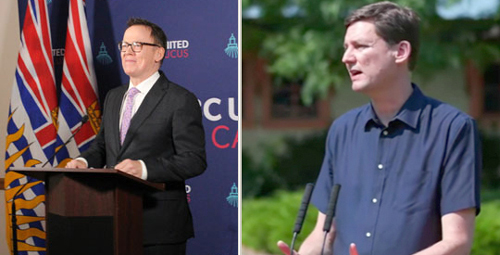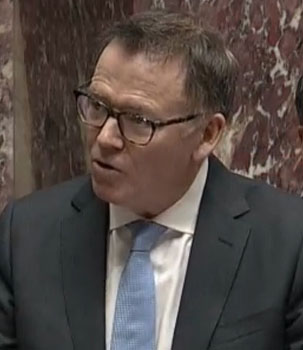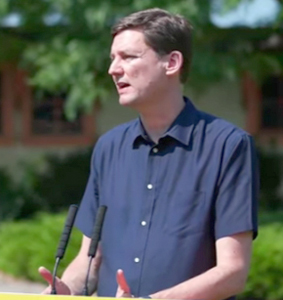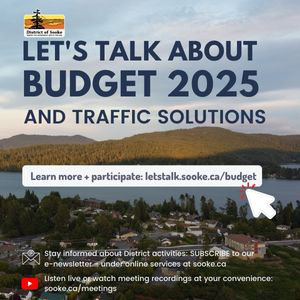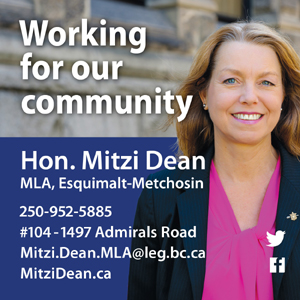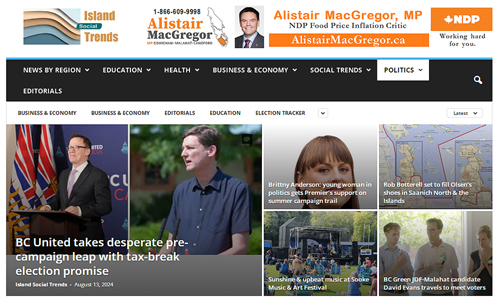Tuesday August 13, 2024 | VICTORIA, BC
Political analysis by Mary P Brooke | Island Social Trends
Gunning for votes from well-paid workers and the corporate business sector, today BC United Party Leader Kevin Falcon announced a basic personal exemption from provincial tax.
He promises to increase the basic personal tax exemption from $11,980 to $50,000.
What a whack that would be to the provincial budget. There’s no question that would include a result of less money for affordability programs that the BC NDP government have invested in for people who live on modest incomes.
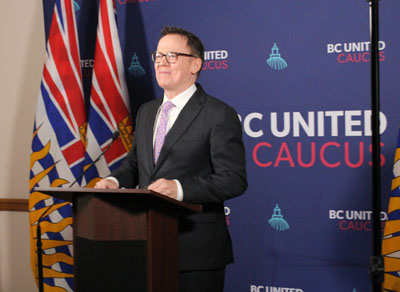
This is a direct promise to middle-class voters who are otherwise relatively secure. Falcon made the announcement in downtown Victoria across from the back of the main BC Legislative building.
Politically-speaking it seems like a desperate leap to win over a certain sector of voters who might otherwise lean to voting for BC Conservative in this election; it’s doubtful that any loyal BC NDP voters would pay attention to this.
And that’s just it, it’s a promise. Fulfilment of that promise would require the BC United Party winning a majority government in the October 19 election, or at least enough seats to influence a would-be reduced NDP majority or even manouevre through a mixed-bag of NDP, Conservative and BC United influence in the next legislature in 2025.
Whether the one promise will liberate would-be Conservative or would-be NDP voters is an open question.
If the tax promise did actually come true, it wouldn’t likely kick in until the 2025 tax year, meaning in-pocket results for benefactors in 2026 at the earliest.
remier Eby weighs in:
“British Columbians can’t afford that approach any more,” says Premier David Eby in a media session today, referring to how the BC United would cut supports in order to afford tax cuts for stable earners.
“He is truly revealing who he is,” said Eby, including that Falcon is “even farther to the right than John Rustad”.
How it would work:
If elected, BC United would eliminate provincial income tax on the first $50,000 earned by every British Columbian.
“The plan would result in the complete elimination of provincial income tax for 60 percent of people, while putting an extra $2,050 per year back into the pockets of British Columbians,” it was stated in a news release this morning, August 13.
BC United says they will “will make life more affordable by”:
- Putting $2,050 in your pocket: Increasing the Basic Personal Exemption from the current $11,980 to $50,000.
- Eliminating income tax for 60 percent of British Columbians: Ensuring more than 2.4 million British Columbians will pay no provincial income tax.
- Providing relief for average earners: Nearly eliminating provincial income tax for average taxpayers (average income is $54,450).
“BC United will implement the largest middle class tax cut in B.C.’s history by eliminating the provincial income tax for 60 percent of British Columbians. This historic tax cut will put an average of $2,050 back into your wallet, helping you afford essentials like food, gas, and kid’s extracurricular programs,” said Falcon in today’s news release.
“David Eby’s NDP have made British Columbia unaffordable with a blizzard of taxes over eight years in power. BC United’s tax cut policy would immediately be reflected in higher paycheques for folks across the province who are struggling right now. Only BC United will create a more affordable British Columbia.”
When Falcon refers to paycheques he is not relating to self-employed folks or to seniors or those on low or limited incomes.
Population increase as a source:
Falcon appears to believe that the fast-increasing population in BC will be a steady revenue stream for the province. “For the first time in more than a decade, more people are leaving B.C. than moving to the province. This historic tax cut will put more money back into the pockets of students, families, and seniors,” he stated today.
The tax cut is projected to cost $5.4 billion annually, as stated by BC United. That’s about one percent of BC’s nominal GDP, they say.
“The expected increase in economic activity, consumer spending, and job creation is anticipated to offset a significant amount of the revenue loss,” says BC United in their news release today.
A significant population increase also comes with a significant requirement for expenditure on basic population supports like schools and health-care.
How sustainable?
“Completely eliminating income tax for 60 percent of British Columbians in the middle of this NDP affordability crisis will ensure our children, nurses, doctors, and families can actually afford to live in our province again,” added Peter Milobar, BC United Shadow Minister for Finance and MLA for Kamloops North-Thompson.
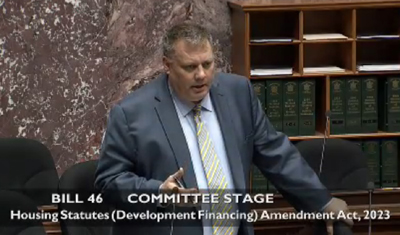
It’s questionable how sustainable a tax cut of that extreme would be. With an eventual strain on the provincial revenue stream, it probably wouldn’t last. Especially by a party that promotes a balanced budget and fiscal responsibility.
===== RELATED:


